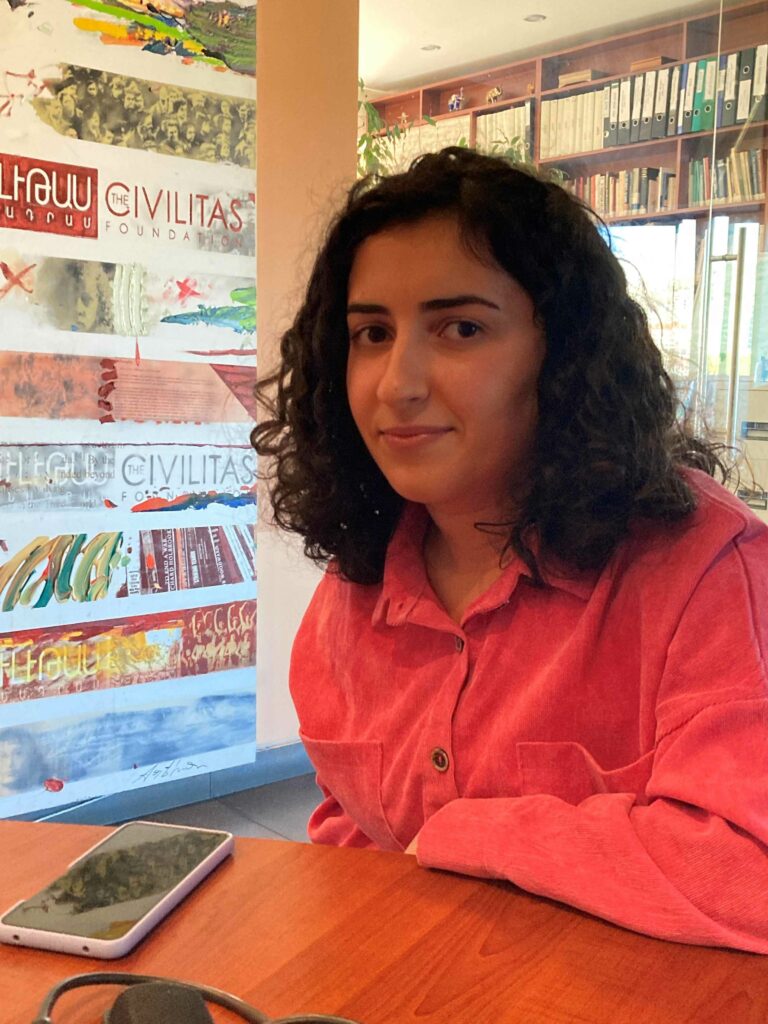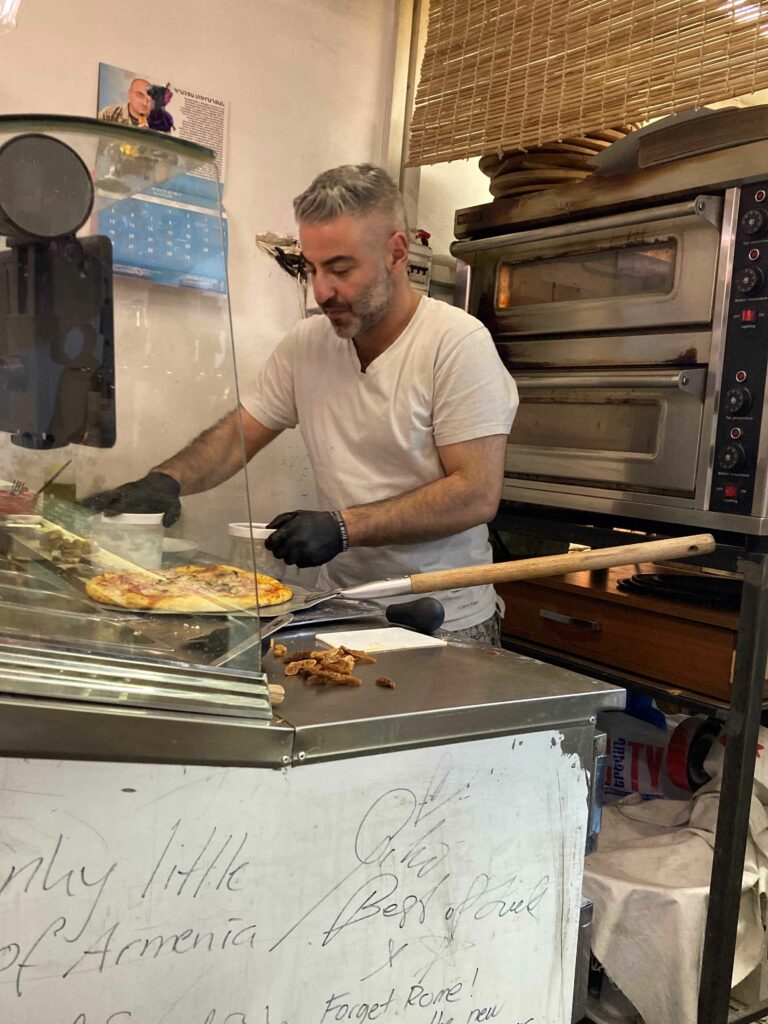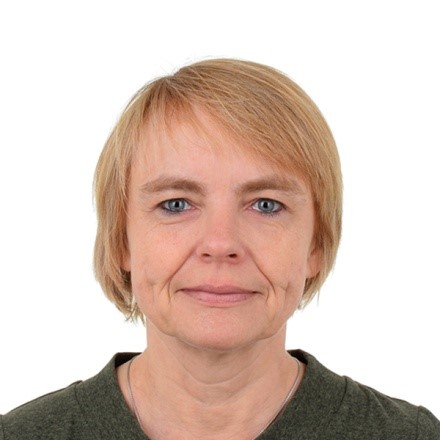by Margarete Wohlan
Just two months ago, 23-year-old Siranush Adamyan was working in Stepanakert as a reporter for CivilNet, an independent journalistic online platform based in Yerevan. Until Azerbaijan’s military offensive on September 19, she was living with her parents and younger sister in Karmir Shuka, a village in Nagorno-Karabakh. “I think it will take me a long time to really understand this. Because I have spent my entire life there.”

Around 100,000 Armenians experienced displacement at the hands of the Azerbaijani military in just 84 hours. Most of those people managed to only take their passports and some money when fleeing to Armenia. As a result, the region is now referred to by Azerbaijan as “Armenian-free.” The EU Parliament speaks of “ethnic cleansing” of the Armenian population. Azerbaijan also wants to eliminate any traces of Armenian life in Nagorno-Karabakh, says the head of the “Research Center on Security Policy” Areg Kochinyan. “They erase all Armenian writings from the walls, all crosses from Armenian churches. They destroy cemeteries, schools, kindergartens, cultural centers – everything that could serve as a sign of Armenian presence.”
Civil society is helping, the government is overwhelmed
The refugees find solace solely in their survival. But in Yerevan, the government under Prime Minister Nikol Pashinyan was unprepared for this mass exodus, explains Boris Navasardian, former president of Yerevan Press Club and political analyst. “Civil society is much more efficient than the government. They act, I would say, with higher moral responsibility than the government. Many Armenians have welcomed refugees into their homes, providing food and a listening ear.”
Like Gohar Shaljyan and her mother Liana who are involved in helping refugees. “Nobody knew how this conflict would end,” says 57-year-old Liana. “It was very hard for me to see people losing their houses, their homeland, their entire lives. We try to help them as much as possible: finding housing, arranging furniture and medical necessities, and aiding in job searches – everything that might help them get on their feet.”
Everyday life in Yerevan has changed equally for mother and daughter – not just when refugees started arriving from Nagorno-Karabakh, but even prior to that when Russians began fleeing to Armenia to avoid the military conscription. “Prices have skyrocketed,” says Gohar, “rents, cafes, restaurants, everything.
Returned diaspora Armenians are changing the society
Walking through the Armenian capital, one encounters a blend of Russian and Armenian languages. Citizens from both nations can travel between their countries without a visa. Russian culture is deeply rooted within the Armenian one – even though Russia did not protect Nagorno-Karabakh Armenians from Azerbaijan, as originally promised.
This distinguishes them from the so-called Diaspora Armenians, the third major group in Armenian society. There are talks of around 80,000 Armenians who have returned in recent years. They have an impact on life in Armenia, says political analyst Boris Navasardian. “They bring different cultures that open up the country, added to that, they have a good and efficient way of doing business. That changes the society.”
They also think differently about the conflict in Nagorno-Karabakh compared to the Armenians who have always lived in the country and are angry and feel alone. Dareh, on the other hand, an Armenian who returned from Australia, believes that everyone is responsible for their own life. “We Armenians must self-reflect, understand who we are and stop constantly clinging to Mother Russia’s coattails. Many people here think along those lines, especially the Diaspora Armenians. The reason we lost the war could be because we constantly relied on Russia or Iran or France to help us!”

Political situation in Armenia is relatively stable
There are three quite diverse social groups that will shape the future of Armenia: the refugees from Nagorno-Karabakh, traumatized and desperate, some still in search of their missing relatives. Then, there are the Armenians who have always lived in the heartland, a significant number disappointed with the government, having retreated into private life. Lastly, the Diaspora Armenians who brighten up the mundane routine with their entrepreneurial spirit and their optimism.
For the former president of Yerevan Press Club Boris Navasardian, this is not the worst way to start a new era: “For Armenians, political solutions currently take a back seat. They are more focused on other things: managing their private lives, taking care of their business, pursuing their careers. And the advantage of the political system in Armenia is that the government doesn’t stop them from doing that. You are free here. Hence, while I’m not optimistic, I am also not worried about the political situation in the country. What we need is stability, security, peace with our neighbors and liberation from Russian influence.”
This article was published within the frames of “Correspondents in Conflict” Project,
implemented by Yerevan Press Club and Deutsche Gesellschaft e. V. The Project is
funded by the German Federal Foreign Office within the “Eastern Partnership Program”.
The contents of this article are the sole responsibility of the implementing partners and can in
no way be taken to reflect the views of the Federal Foreign Office. #civilsocietycooperation
Margarete Wohlan, a sociologist and journalist, pursued her Sociology studies in Bielefeld (Germany) and Dundee (Scotland). Following her graduation with a diploma, she enrolled in a journalist school in Berlin. Since 1997, she has worked as a freelance professional in radio and television, focusing on the former Eastern Bloc. Her career journey led her to join the national public radio Deutschlandfunk Kultur in 2015, where she currently serves as an editor and author.













